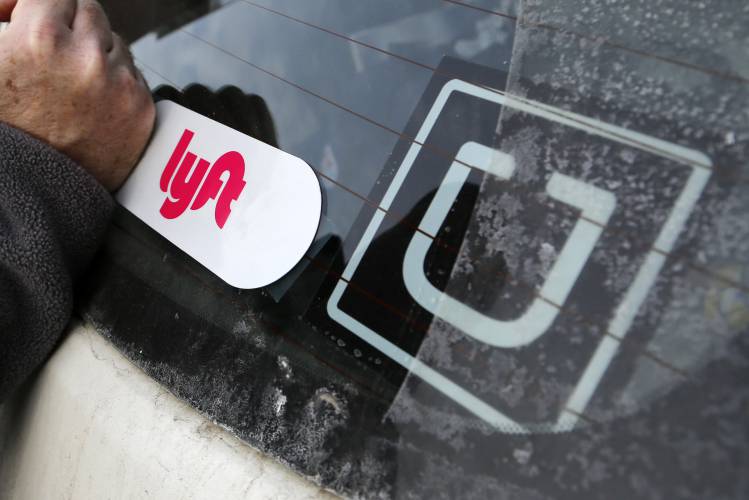Beacon Hill Roll Call: Oct. 14 to Oct. 18, 2024

A Lyft logo is installed on a Lyft driver’s car next to an Uber sticker in Pittsburgh in 2018. Ballot Question 3 asks Massachusetts voters if they approve of a proposed law that would allow drivers for Lyft and Uber, and any other companies that use a digital network to connect riders to drivers for pre-arranged transportation, to collectively bargain to create negotiated recommendations concerning wages, benefits, and terms and conditions of work. AP File Photo/Gene J. Puskar
| Published: 10-25-2024 1:28 PM |
There were no roll calls in the House or Senate last week. This week, Beacon Hill Roll Call looks at Question 3, one of the five questions on the ballot that will be decided directly by the voters in November.
The question asks voters if they approve of a proposed law that would allow drivers for Lyft and Uber, and any other companies that use a digital network to connect riders to drivers for pre-arranged transportation, to collectively bargain to create negotiated recommendations concerning wages, benefits, and terms and conditions of work. Drivers would not be required to engage in union activities.
Companies would be allowed to form multi-company associations to represent them when negotiating with the union. The state would supervise the labor activities permitted by the proposed law and would take responsibility for approving or disapproving the negotiated recommendations.
WHAT SUPPORTERS SAY: “Voting ‘yes’ on Question 3 is about giving these Massachusetts rideshare drivers what nearly every other worker in the state has: the option to join a union,” Roxana Rivera, co-chair on the Yes on 3 Coalition, told Beacon Hill Roll Call. “We know this is what our state’s rideshare drivers want. A recent driver survey showed 95% support for the option to join a union and Question 3 won’t force any rideshare drivers to join the union if they don’t want to. Seventy percent of voters support Question 3, according to a just-concluded poll of likely 2024 voters. Nationally, unions are more popular than they’ve been in generations.”
On its website, Yes on 3 says, “The option to join a union is guaranteed for most workers but rideshare drivers don’t have that choice. Drivers are struggling to support their families despite working in a billion-dollar industry. After expenses, they take home less than $15 an hour, the minimum wage, with no protections against arbitrary deactivations that make it impossible to support their families. Vote ‘yes’ on Question 3 to ensure drivers can challenge these unfair practices.”
WHAT OPPONENTS SAY: Paul Craney, a spokesperson for the Massachusetts Fiscal Alliance, told Beacon Hill Roll Call that although the alliance is not a ballot questions committee, “[we] authored the voter guide (red book) summary because we are ideologically opposed to the ballot question and wanted to make sure the voters had both sides of the story available to them before making a decision.”
Craney continued, “No group from the affected industries has stepped forward to oppose this ballot question. The way this ballot question is currently written potentially violates state and federal labor law and if passed by the voters, would most likely result in a prolonged legal battle before this potential law is changed.”
On its website, the alliance says, “The passage of this question will allow state government to set the wages for these private companies, and ultimately force drivers to pay dues into a union they don’t want and that they have little control over. This is possible because this question artificially lowers the threshold required to call a unionization vote from the normal 30% of employees to just 2.5%. Not only is this unfair to drivers, but this is also a violation of long-established federal labor laws and will likely open the state up to lawsuits and litigation in the future, if passed.”
Article continues after...
Yesterday's Most Read Articles
OFFICIAL ARGUMENTS: Here are the official arguments, gathered by the secretary of state, for each side of the question.
IN FAVOR: Written by Roxana Rivera, United for Justice, www.DriversNeedUnion.org
“A ‘yes’ vote will give Massachusetts rideshare drivers, who work for companies like Uber and Lyft, the option to join a union while also maintaining driver flexibility and independence. The option to join a union is guaranteed for most workers but rideshare drivers currently don’t have that choice. Vote ‘yes’ to allow rideshare drivers the option to choose a union.”
AGAINST: Written by Massachusetts Fiscal Alliance, www.massfiscal.org
“Drivers and riders urge ‘no’ on Question 3, which would raise the prices for all riders, funding union pockets, not drivers’ pockets. This law gives politicians the right to set rules with no accountability and creates a new radical labor category that is inconsistent with federal labor law.
Drivers in Massachusetts already receive base [pay] of $32.50 per hour with yearly increases; paid sick leave; paid family medical leave; health care stipend; on-the-job injury insurance; anti-discrimination protections; domestic violence leave; anti-retaliation protections; and an appeals process.
Question 3 does not really create bargaining for workers. Drivers will have no control over leadership of the union and will pay significant dues without real representation. This proposal is not fair to drivers and allows just 2.5% of drivers to force unionization and leaves many drivers without a voice.”
Rep. Jeff Roy, D-Franklin, and Sen. Mike Barrett, D-Lexington, co-chairs of the Committee on Telecommunications, Utilities and Energy, announced that their conference committee is finalizing details of a compromise version of different versions of House and Senate bills that make changes in the comprehensive climate and clean energy siting and permitting practices.
“We are proud to announce that we have reached an agreement in principle that resolves the differences between the House and Senate versions of the comprehensive climate and clean energy siting and permitting legislation,” said Roy and Barrett in a joint statement. “Massachusetts must continue to be a national leader in the effort to combat climate change, a prerequisite for which will be transitioning to a clean energy economy and creating high-quality jobs in the process. That’s why our respective teams are working diligently to file the conference report in the coming days, with the goal of sending these critical reforms to the governor’s desk for her signature as soon as possible.”
“Gov. Healey is excited that the Legislature has reached an agreement on this critical climate bill that will strengthen Massachusetts’ global leadership in creating clean energy jobs and reducing costs,” a spokesperson for Healey said. “She looks forward to receiving it.”
“For Massachusetts to truly be a leader on climate change, equitable siting reform and curbing the expansion and overspending in our gas system must be priorities for lawmakers,” said Caitlin Peale Sloan, vice president of the Conservation Law Foundation Massachusetts. “We’re eager to see what is included in this bill and will continue to advocate for the necessary changes to slash climate-damaging pollution, meet our climate targets and ensure new clean energy infrastructure avoids burdening those of low to moderate-income and communities of color.”
The Healey administration announced that state agencies and Regional Homeland Security Advisory Councils representing all areas of Massachusetts will receive $19.2 million to strengthen the state’s resilience and preparedness against terrorism.
“This grant program allows our administration to identify evolving threats to our state and invest in measures to be better prepared to prevent and respond to threats and critical incidents,” said Gov. Maura Healey. “We’re grateful to the Biden-Harris administration for prioritizing the safety of our communities through these investments.”
“Preparedness is our greatest protection against threats,” said Public Safety and Security Secretary Terrence Reidy. “Collaboration across all levels of government combined with the necessary funding ensure that our cities and towns are prepared to respond and equipped to prevent potential emergencies. This grant is critical to safeguarding our communities and ensuring a coordinated, effective response in times of need.”
Gov. Healey announced the awarding of $1.75 million in Energy Efficiency and Conservation Block Grants to 45 municipalities across the state to fund 29 clean energy initiatives that help municipalities meet their own climate goals and share the benefits of climate action equitably.
“Massachusetts’ cities and towns are on the front lines fighting climate change, and we are committed to supporting their efforts through funding like Energy Efficiency and Conservation Block Grants and more broadly through our Green Communities Program,” said Executive Office of Energy and Environmental Affairs Secretary Rebecca Tepper. “These grants will help municipalities reduce their use of harmful fossil fuels, protect local governments from energy price volatility and help build more resilient communities.”
“Energy efficiency and building decarbonization is core to our strategy to combat climate change and lower energy costs,” said Department of Energy Resources Commissioner Elizabeth Mahony. “With this funding, 45 communities will get another chance to reduce their energy needs and municipal budgets.”
Attorney General Andrea Campbell’s office announced it is seeking public feedback on the drafting of consumer protection regulations for assisted living residences in Massachusetts. Members of the public can provide comments to the office through an online form, available at massgov.formstack.com/forms/community_feedback_on_ago_assisted_living_residences.
“We know the best way to serve our constituents is by listening to them,” Campbell said. “Every resident of an assisted living facility has the right to live in a safe and habitable environment, free from abuse, neglect and exploitation. Our older adults deserve to age safely with dignity and respect, which is why creating consumer protection regulations for assisted living facilities is so important and responsive to their advocacy.”
Assisted living residences are designed for older adults who can live independently in a home-like environment, but may need help with daily activities like housekeeping, bathing or medication assistance. According to the Executive Office of Elder Affairs, more than 17,000 people live in these residences in Massachusetts and have various options available to them.






 ‘It’s a Wonderful Night in Turners Falls’ showcases village businesses, nonprofits
‘It’s a Wonderful Night in Turners Falls’ showcases village businesses, nonprofits Sackrey Construction Co. of Sunderland celebrating 35 years in business
Sackrey Construction Co. of Sunderland celebrating 35 years in business Photo: As darkness falls
Photo: As darkness falls Leverett residents rap Kittredge compound plans, urge caution as negotiations for 400 homes move forward
Leverett residents rap Kittredge compound plans, urge caution as negotiations for 400 homes move forward 
